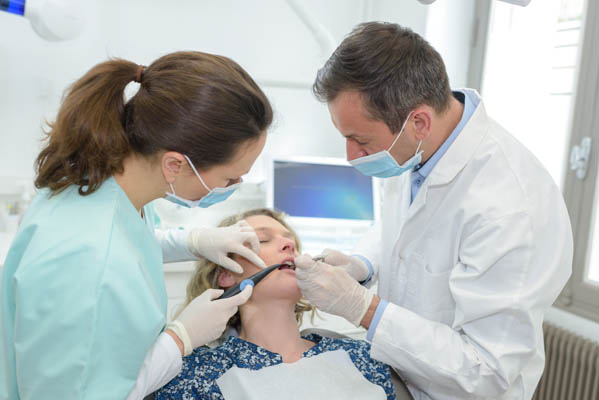Ask a General Dentist: What Does Saliva Do for Our Mouths?

A general dentist has a wealth of information on a variety of oral-health-related topics. It is the dentist's job to bestow this knowledge onto all patients, even for mouth functions that may be widely overlooked.
Saliva plays an important role in our mouths, and without it, our oral health would be a disaster. Education about saliva is important, and learning from an experienced general dentist is valuable for any dental patient wanting to better their oral health.
What is saliva made up of?
Saliva is a fluid substance formed in the mouths of animals and humans. Human saliva is composed of 99.5 percent water. The other half percent is a combination of electrolytes, mucus, white blood cells, enzymes and other antimicrobial agents naturally produced by the body. There are even small amounts of hydrogen peroxide, an antibacterial compound, found in saliva. The enzymes work with the water to fight bacteria and break down food.
What is the purpose of saliva in the mouth?
Saliva serves many important purposes in the mouth. For one, the enzymes in the fluid start the process of digestion before the food has even left the mouth. Those enzymes start to break down food the second they enter the mouth, working especially well on starches and fats.
Saliva serves as a rinsing agent for the teeth and washes them effectively after every meal and snack. The fluid breaks down food particles that can get stuck in between teeth. By making these crumbs smaller, it helps to prevent the formation of cavities. Tooth decay takes hold when residue and particles are leftover on tooth surfaces from eating or drinking. If saliva was not there to save the day, our teeth would be much more susceptible to cavities.
Harmful bacteria in the mouth are counteracted when there is a good amount of healthy saliva to dilute the bacteria. Bacteria feed off of carbohydrates in the mouth and produce acid as waste during digestion. This acid eats away at the enamel, and that is what causes tooth decay. Saliva carries leftover food particles away from the teeth and into the digestive system.
Another helpful characteristic of this vital fluid, saliva acts as a lubricating liquid. It wets food and allows easier swallowing. It also serves as a protector of the mucosal surfaces of the oral cavity and prevents dehydration of this tissue.
What is dry mouth?
Since saliva is mostly made of water, one sign of dehydration and other health issues is the presence of dry mouth or lack of sufficient saliva production. Saliva helps us digest and even taste food, and without it, the system comes to a grinding halt. Little to no saliva production affects more than just thirst.
Symptoms of dry mouth include cracked lips, sores at the corners of the mouth and a rough, dry tongue. Swallowing becomes more difficult, as does speaking. With decreased saliva, the mouth starts to go through some negative changes. Since the fluid is not able to flush the food particles and debris out of the mouth, it can cause bad breath. Feeling hoarse or a dry cough originating from a tickle in the throat could mean dry mouth.
The bottom line
At our general dentistry office, we strive to arm patients with knowledge. If you are experiencing any symptoms of dry mouth, it could mean other health issues are present. Make an appointment as soon as possible to get your mouth back to health.
Request an appointment here: https://www.realgooddentist.com or call City Centre Dental at (248) 423-9393 for an appointment in our Southfield office.
Check out what others are saying about our services on Yelp: Read our Yelp reviews.
Recent Posts
Looking for an implant dentist? If you are nervous about getting dental implants to replace one or more missing teeth, then one way to minimize your stress and anxiety is to find an experienced implant dentist that you can trust. There are several effective tips and strategies for ensuring you are able to find the…
Oral surgery is often necessary to remove impacted teeth. A tooth is said to be impacted if it fails to emerge fully through the gum tissues because something inhibited its eruption, such as bone, malocclusion, cysts, dense soft tissue or other teeth. This problem is common with wisdom teeth, usually because there is no longer…
Wondering if implant supported dentures are the right for you? In order to make the right choice, it is necessary to understand everything there is to know about all types of dentures.Considering implant supported dentures but want to understand more about the details? This denture choice requires one to undergo a dental implant placement surgical…
Wondering whether root canal therapy is in your near future? The only way to know is to make an appointment with a general dentist for a full oral evaluation. While most dental patients know they have a problem tooth, not all tooth infections cause pain.A tooth infection occurs when bacteria are able to get inside…


